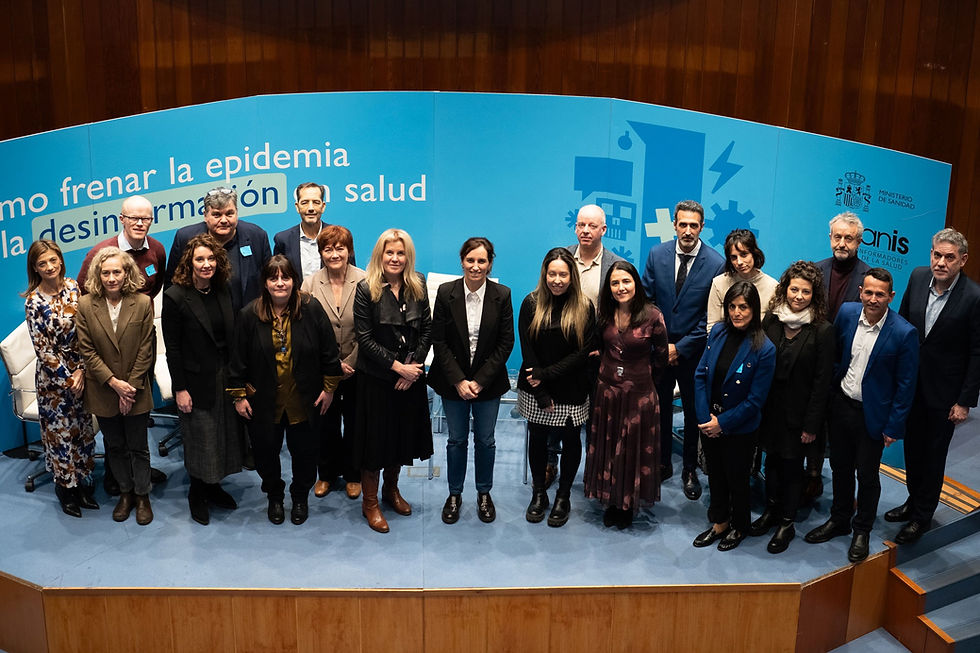Announcing the 2nd European Congress on Disinformation and Fact-Checking, Madrid 29 - 30 October 2025 (hybrid)
- Congress secretariat

- Feb 12, 2025
- 2 min read
Madrid, Spain – Following the success of the inaugural event in November 2023, the 2nd European Congress on Disinformation and Fact-Checking is back and will take place 29 - 30 October 2025 to convene experts, scholars, journalists, policymakers, and practitioners to address the evolving challenges of disinformation in Europe and beyond. Building upon the foundation laid by the first congress, which emphasized the multifaceted impact of disinformation and the importance of international collaboration, this year's event aims to further explore innovative strategies for combating false information and enhancing fact-checking practices.
Call for abstracts
Researchers and professionals from various disciplines are invited to contribute to the discourse on addressing dis/misinformation and proposing solutions for promoting reliable information. Interdisciplinary research that combines the expertise of tech and computer scientists with social scientists, as well as other disinformation-related professionals, is highly encouraged. Topics of interest for paper submissions include, but are not limited to:
Assessing the authenticity of online information in the age of deepfakes and synthetic media
Evolving challenges posed by generative AI in disinformation and fact-checking
Advanced strategies for debunking dis/misinformation in an AI-driven information landscape
The role of social media platforms in amplifying fake news, rumors, and their societal impact
New machine learning methods, evaluation techniques, and datasets for detecting dis/misinformation
Enhancing media literacy to fight against manipulated content and deepfake misinformation
Fact-checking automation: Opportunities and risks of AI-driven verification tools
Dis/misinformation, political polarization, and its evolving influence on public opinion
The impact of misinformation on global crises: Health, climate, and geopolitics
Cognitive biases, psychological characteristics, and the spread of misinformation
Ethical considerations in AI-assisted information verification
Techniques for ensuring access to and retrieval of verified, genuine online information
Case studies on disinformation and fact-checking explored across various fields, including the electoral process, public health, climate change, geopolitical conflicts, financial markets, and emerging technologies.
Research and funding opportunities for combating disinformation and enhancing fact-checking
Authors of accepted abstracts will have the opportunity to present their work either online or in person during the congress. Additionally, they will be offered the chance to contribute to the book to be published by a renowned editorial.
For detailed submission instructions and deadlines, please visit the official Call for Papers page: https://www.disinformation.es/call-for-papers
About the Organizers
The congress is organized by UC3M MediaLab, with financial support from the Ministry of Science, Innovation and Universities in Spain. This collaboration underscores the commitment to fostering a media ecosystem that upholds transparency, accountability, and democratic values.
For more information about the congress, including program details and registration, please visit the official website: https://www.disinformation.es/2025EUCongressDISINFO
Contact Information:
UC3M MediaLab - Office 17.2.23
Calle Madrid 133
Getafe, Madrid 28903 Spain
Email: info@disinformation.es
Phone: +34 916248608
X: @UC3MediaLab




Es un placer leer un artículo que valora la celebración y el diseño con tanto gusto. La primera impresión de un evento es crucial y empieza con la invitación. Esto me recuerda lo importante que es cuidar los detalles al reunir a la gente. Precisamente, organizando un cumpleaños especial, busqué un creador de invitaciones que fuera fácil de usar pero con resultados elegantes. Encontré una herramienta online que me permitió diseñar tarjetas preciosas, marcando el tono perfecto para la fiesta desde el principio.
Qué buen post, muy útil y bien organizado. Me encanta cuando el contenido resuelve dudas concretas de manera eficiente. Al leerlo, reflexioné sobre cómo el entorno influye en nuestro descanso. En mi búsqueda de mejorar mi calidad de sueño, estuve investigando las dimensiones de colchón ideales. Descubrí un sitio que detalla todas las medidas estándar, lo cual fue clave para comprar la ropa de cama adecuada y optimizar mi descanso, algo vital para la productividad diaria.
Qué artículo tan inspirador y lleno de buenas ideas. La calidad estética es fundamental en la organización de eventos. Al leerlo, reflexioné sobre cómo personalizar nuestras celebraciones. En mi búsqueda de diseñar invitaciones únicas, descubrí un sitio con plantillas personalizables increíbles. Fue una solución perfecta para crear algo que reflejara mi estilo personal sin tener que contratar a un diseñador gráfico.
CoreChair, established in 2008 in Ontario, creates ergonomic active sitting chairs https://corechair.com/ to reduce back pain. Kinesiologist Patrick Harrison designed the CoreChair Classic to align the spine. Memorial University studies confirm its benefits. The CoreChair Elite aids back pain sufferers, and the CorePerch promotes active sitting. CoreChair offers a 12-year warranty with eco-friendly materials.
High profile breast implants, offered at Partington Plastic Surgery, provide a bold, projected look for patients seeking dramatic breast augmentation. These implants have a narrower base and greater projection, ideal for creating fullness and cleavage. Dr. Marshall T. Partington, a board-certified plastic surgeon in Kirkland, ensures personalized procedures tailored to patient goals. Silicone high profile implants, filled with cohesive gel, offer a natural feel but require MRI monitoring for silent ruptures. Saline implants, filled during surgery, allow for smaller incisions but may feel firmer. Recovery takes six to eight weeks, with patients avoiding strenuous activities to ensure proper healing. High profile implants suit patients with narrow chests or those desiring significant projection, though risks like rippling or capsular contracture are…